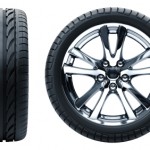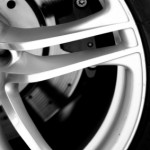 The business of new wheels for cars has become a multi-billion-dollar venture. Motorists more and more are swapping out old stock wheels for something with more style or for a better ride.
The business of new wheels for cars has become a multi-billion-dollar venture. Motorists more and more are swapping out old stock wheels for something with more style or for a better ride.
If you are starting the process to sell a used car and want to spruce up its look for potential buyers, there are multiple options.
Many car owners go for bigger, rather lavish new wheels for style, and to be different. With so many Toyota Camrys out on the road today, for example, and often the same color, why not make yours stick out from the crowd?
Then there are physical improvements. Bigger wheels and tires help to sell a used car because your vehicle will have enhanced handling. The grip on cornering will be noticeably better for a potential buyer during a test drive. Be sure to talk it up.
The wider the wheel, the more rubber meets the road, so to speak, making turning easier even at higher speeds. There are also tires with short sidewalls, called low-profile tires, which deliver faster and more responsive turning actions.
That considered, as you try to sell a used car and think about new wheels, you have to weigh the cost-benefit ratio.
Cost-Benefit for New Wheels and Selling a Used Car
It’s a no-brainer that the bigger the wheels or tires, the bigger the payment. If you are hard-pressed to get cash for used cars and fast, you most likely don’t have a budget to spend thousands of dollars on new wheels.
What are the costs? For a set of four, anything from $750 on up to $5,000, according to Westways magazine, the publication by the Automobile Club of Southern California.
The bigger the car, the more the new wheels tend to cost. So to sell a used car, your investment in new wheels likely will be larger if you’re selling a truck or sport utility vehicle.
Here is an additional cost that you should keep to yourself to sell a used car: insurance. Adding expensive, custom equipment adds another attraction for thieves, and some insurance companies may require an owner to purchase more coverage.
On the flip side, one could argue that wider wheels means better handling and therefore more ability to avoid dangers and safer driving. An insurance appraiser might not buy it, but it’s something in your toolbox to argue.
 Cons Along with Pros to Sell a Used Car with New Wheels
Cons Along with Pros to Sell a Used Car with New Wheels
As you sell a used car, understand other drawbacks to new wheels and tires, including potentially lowered fuel economy, a rougher ride (with shorter sidewalls particularly), and the threat for higher-profile vehicles to rollover at high speeds on tight curves.
Remember that automakers engineer their vehicles with original wheels by considering both ride and handling, and they aim for a balance between the two. In switching wheel sizes, talk carefully with an expert to try to ascertain how the change might impact both ride and handling.
Additionally, greatly increasing the diameter and width of your vehicle’s tires could prove chaotic for antilock brakes, speedometer and odometer, and in newer vehicles computer-controlled vehicle systems.
So as you contemplate adding new wheels for your quest to sell a used car, put some thought into it. Check reports online, and talk with your salesperson to try to learn what the change will do to the vehicle’s performance.
That said, new wheels and tires sure can make your used car look sweet. The exterior look of a vehicle plays a major role in selling a used car, and the investment might just prove to be worth it.
